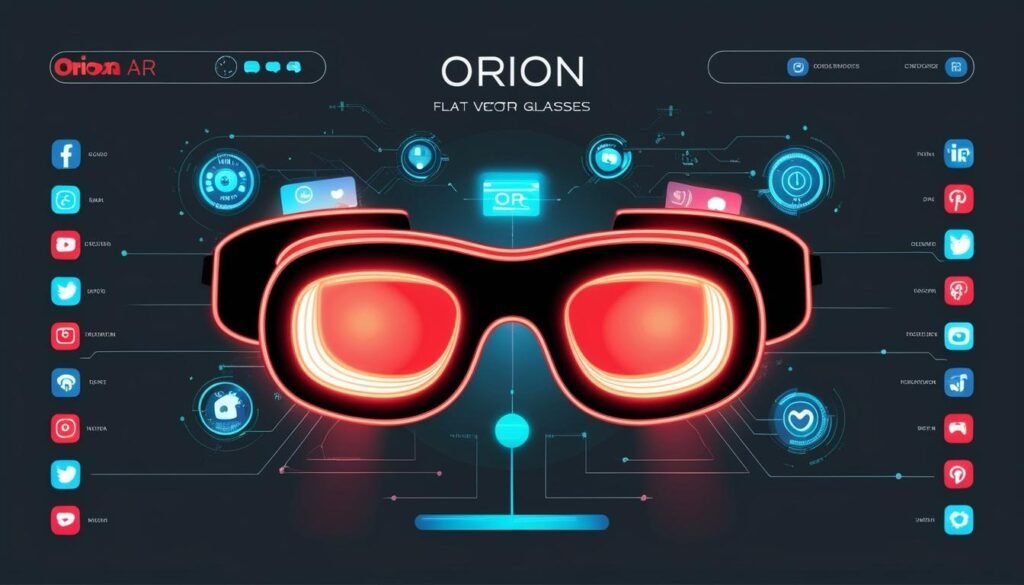Meta CEO Mark Zuckerberg introduces the Orion AR glasses, signalling a potential shift in digital communication and content creation.
In September 2023, Meta CEO Mark Zuckerberg unveiled his latest augmented reality innovation, the Orion AR glasses, during a promotional event that marked a significant milestone in the evolution of digital interaction. This launch signifies the beginning of a potential shift away from traditional screen-based communication towards more immersive spatial interfaces. The operational challenges of previous AR and VR technologies have led to a cautious anticipation surrounding Orion, especially after the underwhelming commercial performance of other devices like Apple’s Vision Pro headset, whose production has reportedly been scaled back due to lack of demand.
Zuckerberg’s venture into the AR market with Orion has sparked discussions about the broader implications for social media. Joe McElligott of MG Empower questioned in a recent article for The Drum what social media might look like in a landscape without traditional screens. He posits that the transition to AR glasses could redefine the very nature of content creation and consumption.
With the absence of fixed aspect ratios, McElligott anticipates that the entirety of the world will become a canvas for content. Traditional media production methods might be phased out in favour of digitally rendered environments, enabling creators to design experiences that can dynamically align with various contexts and scales. Such advances could allow for storytelling rooted in immersive digital experiences rather than the restrictions of physical filming.
Furthermore, McElligott highlights the potential for hyperpersonalisation of content. By utilising advanced features such as facial recognition and mood detection, which Orion glasses are designed to incorporate, social media experiences could become intensely tailored to individual users’ circumstances. This could include contextual advertisements or even curated experiences that cater to a user’s emotional state, transforming the passive consumption model into an interactive engagement framework.
According to McElligott, the shift may also move users from passive involvement to active participation in social media. He metaphorically suggests that the “thumb workouts” familiar in current social media use may become irrelevant as future interactions evolve to incorporate gestures and voice commands. In this evolving landscape, AR-based challenges and interactions may replace the conventional scrolling behaviour, encouraging deeper engagement with content.
Moreover, McElligott reflects on the ever-present nature of AR technology, suggesting that it has the potential to revive longer-form content consumption, as users engage in simultaneous activities without needing to disengage from their digital devices. He notes that this could allow audiences to delve into richer narratives enhanced by augmented overlays tailored specifically to their current activities or needs.
As these technologies gradually integrate into daily life, McElligott raises essential questions concerning societal fragmentation driven by the personalised nature of AR. He theorises the possibility of a reality in which each individual experiences a unique version of social media, potentially leading to further division in information consumption and interpersonal connection.
In conclusion, the arrival of Orion and advancements in AR technology herald significant changes for businesses and users alike, suggesting a future where digital interaction is omnipresent and prominent in everyday life. While the implications of this shift remain to be fully realised, it is clear that the landscape of social media is poised for transformative change as the industry adapts to a world increasingly characterised by augmented experiences.
Source: Noah Wire Services
- https://www.designboom.com/technology/meta-true-ar-glasses-orion-smartphones-hands-free-wearable-ai-device-09-26-2024/ – Corroborates the unveiling of Meta’s Orion AR glasses by Mark Zuckerberg and details the features and technology of the glasses.
- https://www.trendforce.com/presscenter/news/20240926-12313.html – Provides information on the technical specifications and challenges of Meta’s Orion AR glasses, including the use of LEDoS technology and the current status as a research prototype.
- https://www.trendforce.com/presscenter/news/20240926-12313.html – Discusses the operational challenges and the anticipated release timeline for Orion, highlighting the need for improvements in field of view and resolution.
- https://neworleanscitybusiness.com/blog/2024/09/25/meta-unveils-cheaper-vr-headset-ai-updates-and-shows-off-prototype-for-holographic-ar-glasses/ – Supports the information about Mark Zuckerberg’s presentation of Orion at Meta Connect 2024 and the lack of a release date for the glasses.
- https://www.designboom.com/technology/meta-true-ar-glasses-orion-smartphones-hands-free-wearable-ai-device-09-26-2024/ – Explains how Orion AR glasses could replace or be an alternative to smartphones, highlighting their hands-free and wearable AI features.
- https://www.trendforce.com/presscenter/news/20240926-12313.html – Mentions the underwhelming commercial performance of other AR and VR devices, such as Apple’s Vision Pro headset, and its impact on the market.
- https://www.designboom.com/technology/meta-true-ar-glasses-orion-smartphones-hands-free-wearable-ai-device-09-26-2024/ – Details the potential for hyperpersonalisation of content using features like facial recognition and mood detection in Orion glasses.
- https://neworleanscitybusiness.com/blog/2024/09/25/meta-unveils-cheaper-vr-headset-ai-updates-and-shows-off-prototype-for-holographic-ar-glasses/ – Describes how the Orion glasses enable interactions beyond traditional screens, including voice commands and hand gestures.
- https://www.designboom.com/technology/meta-true-ar-glasses-orion-smartphones-hands-free-wearable-ai-device-09-26-2024/ – Highlights the potential for AR technology to transform content consumption, allowing for immersive digital experiences and dynamic content alignment.
- https://www.trendforce.com/presscenter/news/20240926-12313.html – Discusses the broader implications of AR technology on the market and user behavior, including the potential for deeper engagement with content.
- https://neworleanscitybusiness.com/blog/2024/09/25/meta-unveils-cheaper-vr-headset-ai-updates-and-shows-off-prototype-for-holographic-ar-glasses/ – Reflects on the societal and interpersonal implications of personalized AR experiences, such as potential societal fragmentation.


